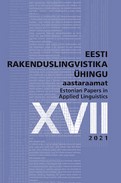RUSSIAN L1 SPEAKERS’ PALATALIZATION IN ESTONIAN AND THE EFFECT OF PHONETIC SPEECH TRAINING
RUSSIAN L1 SPEAKERS’ PALATALIZATION IN ESTONIAN AND THE EFFECT OF PHONETIC SPEECH TRAINING
Author(s): Anton Malmi, Pärtel LippusSubject(s): Phonetics / Phonology, Language acquisition, Comparative Linguistics, Finno-Ugrian studies, Eastern Slavic Languages
Published by: Eesti Rakenduslingvistika Ühing (ERÜ)
Keywords: acoustic phonetics; L2 acquisition; accent; Estonian; Russian;
Summary/Abstract: The purpose of this paper is to find out whether palatalization contributes to Russian-accented speech in Estonian and whether speech training would help to speak more native-like. Although palatalization is a common feature of both Estonian and Russian, it is more salient in Russian. Since in Estonian palatalization is not marked orthographically and there are typological differences between the two languages, we hypothesized that the Russian L1 learners of Estonian will have difficulties in producing secondary palatalization in a native-like manner. A group of students were tested before and after the training and their results were compared to an Estonian L1 group. We found that Russian L1 speakers did not palatalize word-final consonants as Estonian L1 speakers did but they also did not palatalize word-initial consonants. The training did not have an effect on the production of Estonian palatalization of the Russian L1 speakers.
Journal: Eesti Rakenduslingvistika Ühingu aastaraamat
- Issue Year: 2021
- Issue No: 17
- Page Range: 211-230
- Page Count: 20
- Language: English

